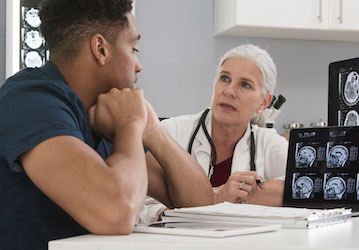Military Service Members are often diagnosed with concussions—a form of mild traumatic brain injury (mTBI)—from blast exposures, physical training, or motor vehicle accidents. In fact, most military TBIs result from blast exposures, and the majority of those are mTBIs. Even though concussion and mTBI are often used interchangeably, not all mTBIs are concussions. More on that later.
In the past, healthcare providers treated concussions by restricting the patient’s physical and educational activities and recommending rest until symptoms went away. Once symptoms (such as headache, nausea, blurred vision, etc.) resolved, patients were cleared to start a progressive return-to-exercise protocol. However, some practitioners now suggest light, closely supervised exercise to help speed up recovery after a concussion.
What is a concussion?
When your head experiences a rapid acceleration (change in movement, speed, or direction) and you sustain a concussion, several things can happen to your brain, including microscopic damage and other chemical responses that can affect brainpower. Brain damage from a concussion is generally so small that it can’t be seen using normal imaging techniques (MRIs, CT scans, etc.).
Concussions cause several different symptoms, including headache, nausea, dizziness or loss of balance, irritability, mood swings, confusion, sensitivity to light or noise (or both), and many others. It’s also a myth that concussions always result in a loss of consciousness. Most of the time, people actually stay awake, although not very alert.
Some practitioners now suggest light, closely supervised exercise to help speed up recovery after a concussion.
How long does it take to heal after a concussion?
The short answer: It depends. Many factors can affect how long it takes to recover from a concussion, including how bad your symptoms are after injury or if you have symptoms of depression or anxiety, though most people typically recover in 1½–2 weeks.
How is a concussion treated?
In general, doctors recommend those diagnosed with concussions should rest until their symptoms go away, usually within 24–48 hours. After that, light exercise—at a level that doesn’t make your symptoms come back—might actually be good for you. It’s also been shown to reduce the amount of recovery time, which leads to a faster return to duty or play. BUT! It’s very important that any exercise after concussion is closely supervised by a medical professional. Don’t start exercising on your own until you’re cleared to, and be sure to follow all related guidance.
Many other options are available to help with concussion management, but they’re specific to each individual case and should be used only as recommended by a qualified health practitioner. The type of injury also can affect how you train or exercise, and not just at a lesser intensity. For example, someone with vestibular issues (inner-ear problems that affect balance) might benefit from vestibular rehabilitation therapy, which focuses on using your eyes to be more aware of your general posture and help with balance issues.
The old way to treat concussions—strict rest, both mental and physical—is now out because not exercising your mind and body can make symptoms last longer. Always follow the advice of your medical professional, but don’t be afraid to ask questions if they’re directing you to strictly rest for more than a few days. There might be a good reason for that rest, but it’s also possible they might not recall the latest on concussion best practices. In addition, developments in the use of exercise to help recovery are very recent, so more studies are still needed.
What is post-concussion syndrome?
If your symptoms persist and you don’t get better after 10–14 days, consult your doctor. If you’re diagnosed with post-concussion syndrome (PCS)—a fairly serious condition—you won’t be able to fully return to normal activity for months on end, which can affect you physically, mentally, and emotionally. Also, keep in mind that PCS is sometimes misdiagnosed as post-traumatic stress disorder (PTSD) because many of the symptoms (irritability, anxiety, sleep problems, etc.) are similar.
PCS is usually treated by managing your symptoms, and this sometimes includes light, supervised exercise. However, it’s especially important that any light exercise—such as walking—is also supervised by a medical professional.
Learn more
If you have a concussion, educating yourself is one of the best tools to help improve your outcome. Check out our list of TBI resources and remember to follow up with your medical provider. You can also visit the Defense and Veterans Brain Injury Center to learn more about prevention, screening, treatment, and caregiver resources.
